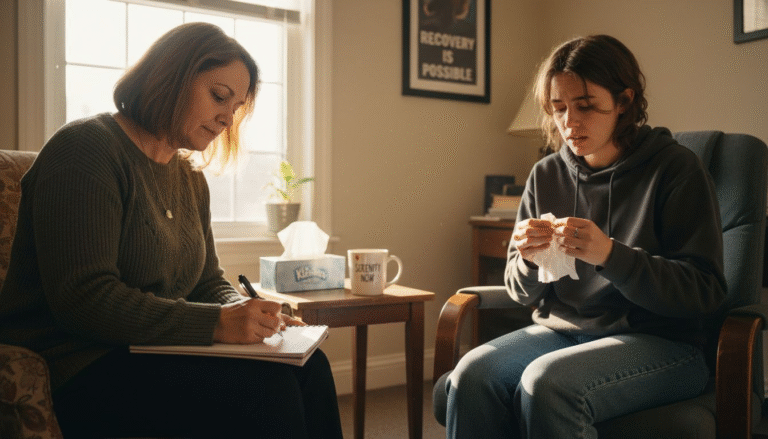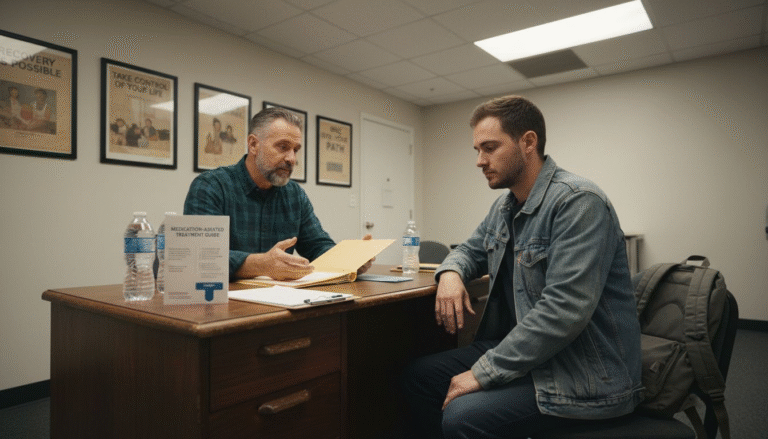Nearly 21 million Americans struggle with at least one addiction, yet only about 10 percent ever receive treatment. If substance use has disrupted your life or someone you love, finding a clear path forward can seem overwhelming. Understanding every step from assessment to ongoing support helps you regain control and lay the groundwork for real, lasting recovery.
Table of Contents
- Step 1: Assess Individual Needs And Set Goals
- Step 2: Select The Right Outpatient Program
- Step 3: Create A Personalized Treatment Plan
- Step 4: Engage In Therapy And Counseling Sessions
- Step 5: Monitor Progress And Adjust Support
Quick Summary
| Key Point | Explanation |
|---|---|
| 1. Begin with a Personal Assessment | A comprehensive assessment is crucial for tailored treatment. This step helps identify unique needs and establishes an effective recovery roadmap. |
| 2. Choose the Right Outpatient Program | Selecting an outpatient program needs careful consideration of factors like intensity and support. Fit your choice to your lifestyle and recovery requirements. |
| 3. Develop a Personalized Treatment Plan | A customized treatment plan should reflect your individual circumstances, including specific goals and coping strategies, ensuring alignment with your recovery journey. |
| 4. Actively Engage in Therapy | Participation in therapy sessions fosters self-awareness and equips you with skills to manage addiction, leading to sustained growth and recovery. |
| 5. Continuously Monitor Progress | Regular progress evaluations with your treatment team ensure that recovery strategies remain effective and responsive to your evolving needs and experiences. |
Step 1: Assess Individual Needs and Set Goals
Your journey toward recovery begins with a comprehensive personal assessment designed to map out a treatment strategy tailored specifically to your unique experiences and challenges. This critical first step helps addiction professionals understand the full scope of your substance use disorder and create a personalized roadmap to healing.
According to the American Society of Addiction Medicine (ASAM), effective treatment starts with a holistic evaluation that goes beyond surface level symptoms. During this initial assessment, a trained counselor will engage you in an in depth conversation exploring multiple dimensions of your health and addiction history. You can expect to discuss topics like your current substance use patterns, mental health background, physical health conditions, family history of addiction, and personal motivations for seeking treatment.
The assessment typically involves a series of structured conversations and potentially standardized screening tools. A professional will ask thoughtful questions about:
- The types of substances you have used
- Frequency and quantity of substance consumption
- Previous attempts at treatment or recovery
- Potential underlying mental health conditions
- Your social support system
- Personal and professional challenges related to substance use
These conversations are completely confidential and designed to help you feel comfortable sharing your experiences. The goal is not to judge but to understand your specific needs and develop the most effective treatment approach.
Helpful Tip: Be honest and open during your assessment. The more transparent you are about your experiences the more accurately professionals can design your treatment plan.
Once the assessment is complete professionals will collaborate with you to establish clear recovery goals. These goals are not one size fits all but personalized milestones that reflect your individual circumstances and aspirations. The next step will involve discussing recommended treatment options that align with your assessment results and personal objectives.
Step 2: Select the Right Outpatient Program
Choosing the right outpatient program is a critical step in your recovery journey. This decision will shape your treatment experience and set the foundation for your path to healing. Understanding the nuanced options available will help you make an informed choice that best supports your individual needs.
According to Help.org, selecting an appropriate rehabilitation facility involves carefully considering several key factors. You want a program that fits seamlessly into your life while providing comprehensive support for your recovery. Start by assessing the practical aspects such as program location, session frequency, and overall duration.
Outpatient programs come in various formats, each designed to accommodate different levels of addiction and personal circumstances. Learn more about the advantages of outpatient programs to understand which might work best for you. Generally, you’ll encounter three primary types of outpatient treatment:
Here’s a comparison of the main outpatient program types:
| Program Type | Intensity Level | Typical Schedule | Best For |
|---|---|---|---|
| Standard Outpatient | Low | 1-2 sessions/week | Mild addiction Busy schedules |
| Intensive Outpatient (IOP) | Moderate | 3-5 sessions/week | Moderate addiction Need more structure |
| Partial Hospitalization (PHP) | High | 5-7 sessions/week | Severe addiction Require daily support |
- Standard Outpatient Programs: Least intensive, typically involving weekly counseling sessions
- Intensive Outpatient Programs (IOP): More structured with multiple sessions per week
- Partial Hospitalization Programs (PHP): Most structured, offering near daily treatment while allowing you to return home
Research from Mass.gov highlights that effective outpatient services often include counseling, educational resources, and specialized treatment options. When evaluating programs, consider these critical elements:
- Counselor expertise and specialization
- Treatment approach alignment with your personal goals
- Flexibility of scheduling
- Insurance coverage and cost
- Availability of additional support services
Pro Tip: Your first choice does not have to be your final choice. Many treatment centers offer assessments and can help you transition between program levels as your recovery progresses.
During your selection process, schedule consultations with potential treatment centers. These initial conversations will help you gauge the program’s approach, ask questions, and determine if their philosophy matches your recovery objectives. The right program will feel supportive, understanding, and tailored to your unique journey.
Once you’ve selected your outpatient program, you will move forward to the next critical phase preparation for your initial treatment sessions.
Step 3: Create a Personalized Treatment Plan
Your personalized treatment plan is the roadmap that will guide your recovery journey. This carefully crafted blueprint transforms the insights gathered during your initial assessment into a strategic approach tailored specifically to your unique needs, challenges, and recovery goals.
According to the Council on Recovery, an effective treatment plan goes far beyond a generic template. It requires a comprehensive screening process that acknowledges your individual strengths and available recovery resources. The American Society of Addiction Medicine (ASAM) emphasizes a holistic approach that considers multiple dimensions of your health and wellbeing.
Learn more about creating effective recovery plans to understand how professionals develop these personalized strategies. Your treatment plan will typically include several key components:
- Specific and measurable recovery objectives
- Detailed strategies for addressing substance use
- Approaches for managing potential triggers
- Mental health support strategies
- Family and social support integration
- Relapse prevention techniques
During plan development, your treatment team will collaborate closely with you to ensure the approach feels authentic and achievable. They will consider factors like your substance use history, mental health background, personal motivations, and existing support systems.
Pro Tip: Think of your treatment plan as a living document. It should be flexible and adaptable as you progress through recovery, allowing for adjustments based on your evolving needs and challenges.
Expect collaborative discussions where you will actively participate in setting goals and defining success metrics. Your input is crucial the plan is not something done to you but created with you as a partner in your recovery journey.
Once your personalized treatment plan is finalized, you will be ready to begin implementing the strategies and techniques designed to support your path to lasting recovery.
Step 4: Engage in Therapy and Counseling Sessions
Therapy and counseling are the cornerstone of your addiction recovery journey. These sessions provide a structured environment where you will develop critical skills, understand the root causes of your addiction, and build strategies for lasting recovery and personal growth.
According to Johns Hopkins Medicine, intensive outpatient treatment typically involves nine or more hours of treatment per week. Learn more about the benefits of individual counseling to understand the comprehensive approach to healing. You can expect a combination of different therapeutic approaches:
- Individual counseling sessions focusing on personal challenges
- Group therapy for peer support and shared learning
- Educational sessions about addiction and recovery mechanisms
- Skill building workshops for emotional regulation
- Relapse prevention strategy development
Mayo Clinic’s Outpatient Addiction Program highlights the importance of diverse therapeutic interventions. During these sessions, you will work closely with trained professionals who understand the complex nature of addiction. They will help you explore underlying emotional triggers, develop healthy coping mechanisms, and rebuild your sense of self.
Pro Tip: Approach therapy with an open mind and genuine commitment. Your vulnerability and willingness to engage deeply will significantly impact your recovery outcomes.
Expect each session to be a collaborative process. Your therapist will guide you but you are an active participant in your healing. You will learn to recognize patterns, challenge destructive thoughts, and develop resilience against potential relapse.
As you progress through therapy, you will gain increased self awareness and practical tools to maintain your sobriety and improve your overall quality of life. The skills you learn will extend far beyond addiction treatment into every aspect of your personal growth.
Step 5: Monitor Progress and Adjust Support
Recovery is not a linear journey but a dynamic process of continuous growth and adaptation. Monitoring your progress allows you and your treatment team to celebrate achievements and make strategic adjustments to ensure your ongoing success.
According to the ASAM Criteria, effective treatment requires regular reassessment to determine if you are progressing effectively or need modifications to your current care plan. Explore the recovery planning process to understand how professionals track and support your healing journey.
Your progress monitoring will typically involve several key components:
- Regular check ins with your treatment team
- Periodic assessment of your treatment goals
- Evaluation of psychological and emotional wellbeing
- Review of potential triggers and coping mechanisms
- Measurement of your overall recovery milestones
The Council on Recovery emphasizes the importance of measuring during treatment outcomes. This means your treatment team will consistently evaluate how well your current strategies are working and be prepared to make informed adjustments.
Pro Tip: Think of progress monitoring like a GPS navigation system for your recovery. Sometimes you might need to recalculate your route to reach your destination successfully.
Expect transparent and collaborative discussions during these progress reviews. Your input is crucial the adjustments are not about criticism but about finding the most effective path forward. Your treatment team will work with you to refine strategies that support your unique recovery needs.
As you continue to grow and heal, your support system will evolve alongside you. This ongoing process ensures that your treatment remains responsive and aligned with your changing circumstances and goals.
Begin Your Personalized Outpatient Recovery Journey Today
Understanding the detailed steps in outpatient addiction treatment can feel overwhelming, especially when facing challenges like finding the right program, creating a personalized treatment plan, and staying motivated through therapy. If you are seeking a compassionate, flexible, and expert-led approach tailored to your unique needs, Glendora Recovery Center offers comprehensive solutions designed to help you overcome these hurdles. Our Partial Hospitalization and Intensive Outpatient Programs provide structured support while fitting into your lifestyle, addressing both substance use and co-occurring mental health concerns.
Take control of your recovery now by connecting with our experienced team who will guide you through every step of your individualized treatment plan. Ready to start building lasting recovery with a flexible schedule and professional care? Reach out to us today at Glendora Recovery Center Contact and discover how our dedicated support can align with the step-by-step process you need to heal.
Frequently Asked Questions
What is the first step in the outpatient addiction treatment process?
Your first step in the outpatient addiction treatment process is to assess your individual needs and set goals. Engage in a comprehensive personal assessment with a trained counselor to map out a tailored treatment strategy that addresses your unique experiences and challenges.
How do I choose the right outpatient program for my needs?
To choose the right outpatient program, evaluate key factors like program location, session frequency, and overall duration. Assess the program types—Standard, Intensive Outpatient, and Partial Hospitalization—and determine which aligns best with your addiction level and personal circumstances.
What should I expect in my personalized treatment plan?
In a personalized treatment plan, expect specific and measurable recovery objectives tailored to your unique needs. Collaborate with your treatment team to outline strategies for managing substance use, mental health support, and relapse prevention techniques.
How often should I engage in therapy sessions during outpatient treatment?
During outpatient treatment, you should engage in therapy sessions based on the program’s structure. For example, an Intensive Outpatient Program typically involves 3-5 sessions per week, allowing you to gain consistent support and develop essential coping skills.
How will my progress be monitored throughout outpatient treatment?
Your progress will be monitored through regular check-ins with your treatment team and periodic assessments of your treatment goals. Expect discussions that evaluate your emotional wellbeing and coping mechanisms, ensuring adjustments are made to keep you on track toward recovery.
Can I change my outpatient program if my needs evolve?
Yes, you can change your outpatient program as your needs evolve. Many treatment centers offer flexibility and will collaborate with you to transition to a different level of care if your progress requires more or less intensive support.
Recommended
- A Journey To Recovery Through Teen Outpatient Treatment.
- outpatient therapy | glendora recovery center | detox glendora
- outpatient detox | glendora recovery center | detox glendora
- Outpatient Mental Health Services: Why Are They More Beneficial?
- What Are the 4 Cs of Addiction? – Dr. Stephen Oreski & Associates
- Study: Drug Testing’s Impact on Long-Term Sobriety – 12PanelNow | 12 Panel Drug Test | Free Shipping




